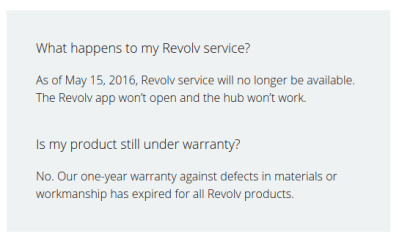Bad news if you bought several Insignia-branded smart devices from Best Buy. The company has decided to shut down the back end systems that make them work — or at least work as a smart device. On the chopping block are smart outlets, switches, a security camera, and an upright freezer. If you bought, say, the freezer, it will still keep things cold. But the security camera will apparently be of no use at all now that the backend systems have gone dark. The company is offering an unspecified partial refund to users of the affected devices.
Best Buy announced this in September, and the shutdown date was last week on November 6th. Not all Insignia products are impacted, just the ones that rely on their app.
Anytime we talk about cloud-based technology, there are always a few people who say something like, “I’ll never rely on anything in the cloud!” Perhaps they have a point — certainly in this case they were right. There are really two things to consider: hardware devices that rely on the cloud, and data that resides in the cloud. In some cases, one product — like a camera — might have both.
We’re Entwined with the Cloud, Like it or Not
It is highly unlikely that Google will pull the plug on, say, Gmail, anytime soon. If that day ever comes, we would expect they’d give us plenty of warning and migration options of some sort. But what if they didn’t? How disruptive would that be to you?
Granted, Gmail is an extreme example both because Google is unlikely to go anywhere and years worth of e-mail is especially valuable to most people. But major platforms do come and go. Yahoo recently decided to cut out a lot of content stored in its Groups product, and earlier this year Google+ shut down its social platform. Both gave a good bit of warning but they didn’t have to. Even with that warning, niche communities who had formed and thrived on these platforms had to scramble to backup as much content as possible, packing up and looking for a new home.
What’s the answer? Stop using cloud services? That would work, but it is very inconvenient. Another strategy is to store nothing online unless you can have full backups locally. That’s workable, too, but requires a lot of discipline to keep backups current and, perhaps, tested. It doesn’t really help with orphan hardware, which is really what we’re talking about with this article.
Source Code Escrow
In industry, large companies often require vendor-supplied software to employ source code escrow — a trusted third party holds private source code and can release it if the depositing company goes out of business or on some other trigger event. Perhaps we need a big cloud provider to offer “service escrow” — a promise to light up a minimal system if the original provider goes out of business.
For example, an online CAD program might decide to guarantee access to your designs via an escrow service. If the company decides to pull the plug, the escrow provider lights up a server that preserves files for download for 30 days in a common format like DXF. The CAD company would advertise this as a benefit to induce you to use their service.
Of course, there are other workable models. Maybe the escrow company could give you your files for $1 each. Whatever the arrangement — what you get, under what conditions, and for what cost — can be outlined before you decide to use the service. The important bit is that you know you have options if the company presses the eject button.
When Bits Stop Playing Nicely with Atoms

The situation gets pretty tricky when it comes to devices like Best Buy’s hardware. Here’s it isn’t merely a case of data being unavailable, but the electronics you spent your hard-earned to acquire end up as paperweights literally overnight.
If the service was profitable, Best Buy would probably keep it running. So the chance that an escrow arrangement would be workable is pretty low. A good example of this is the Revolv hub. This $300 device got bricked after Nest bought them. The FTC even wrote about it.
If you haven’t made it to the comments section yet, here’s a few questions: Are you willing to put your hardware and data at risk with cloud services? Do you stick to big name providers or are you willing to gamble? How about your data? Would service escrow help? Are there other ways to protect consumers from failed providers? On the plus side, if you are wanting to hack some cloud-based hardware, we figure you’ll be able to pick up these Insignia devices for a song.



















